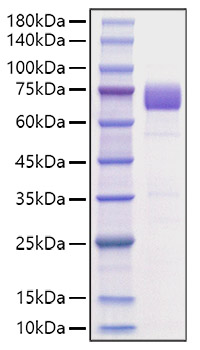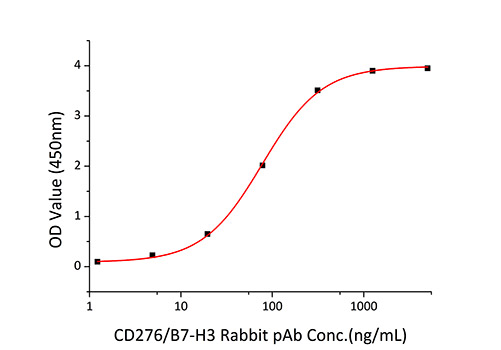Description
Recombinant Mouse B7-H3/CD276 Protein
The Recombinant Mouse B7-H3/CD276 Protein is a high-quality recombinant protein designed for murine biological research applications. This protein serves as an essential reagent in mouse model studies, comparative immunology research, and preclinical therapeutic evaluations, enabling scientists to investigate B7-H3/CD276 biology and its relevance to human disease mechanisms through translational research approaches.
This product (SKU: RPCB1157) is produced using HEK293 cells and features a C-hFc tag for convenient detection and purification. The protein exhibits a calculated molecular weight of 49.45 kDa with an observed molecular weight of 65-75 kDa under denaturing conditions, achieving ≥ 90 % as determined by SDS-PAGE.. Functional bioactivity has been validated through rigorous quality control assays, confirming its suitability for demanding research applications.
Key Features
| High Purity by Affinity Chromatography | |
| Mammalian & Bacterial Expression Systems | |
| High lot-to-lot consistency via strict QC |
| Product Name: | Recombinant Mouse B7-H3/CD276 Protein |
| SKU: | RPCB1157 |
| Size: | 10 μg , 20 μg , 50 μg , 100 μg |
| Reactivity: | Mouse |
| Synonyms: | B7h3, B7RP-2, 6030411F23Rik;CD276 |
| Tag: | C-hFc |
| Expression Host: | HEK293 cells |
| Calculated MW: | 49.45 kDa |
| Observed MW: | 65-75 kDa |
| Gene ID: | 102657 |
| Protein Description: | High quality, high purity and low endotoxin recombinant Recombinant Mouse B7-H3/CD276 Protein (RPCB1157), tested reactivity in HEK293 cells and has been validated in SDS-PAGE.100% guaranteed. |
| Endotoxin: | < 1 EU/μg of the protein by LAL method. |
| Purity: | ≥ 90 % as determined by SDS-PAGE. |
| Formulation: | Lyophilized from a 0.22 μm filtered solution of PBS, pH 7.4. |
| Bio-Activity: | Measured by its binding ability in a functional ELISA.Immobilized Mouse CD276 (RPCB1157) at 2 μg/mL (100 μL/well) can bind CD276 Rabbit pAb (Catalog: A21663) with a linear range of 1-77.4 ng/mL. |
| Reconstitution: | Centrifuge the vial before opening. Reconstitute to a concentration of 0.1-0.5 mg/mL in sterile distilled water. Avoid vortex or vigorously pipetting the protein. For long term storage, it is recommended to add a carrier protein or stablizer (e.g. 0.1% BSA, 5% HSA, 10% FBS or 5% Trehalose), and aliquot the reconstituted protein solution to minimize free-thaw cycles. |
| Storage: | Store at -20℃.Store the lyophilized protein at -20℃ to -80 ℃ up to 1 year from the date of receipt. After reconstitution, the protein solution is stable at -20℃ for 3 months, at 2-8℃ for up to 1 week. |
B7-H3 is a member of the B7 family of immune regulatory ligands that is thought to attenuate peripheral immune responses through co-inhibition. It plays an important role in adaptive immune responses, and was shown to either promote or inhibit T-cell responses in various experimental systems. B7-H3 may play an important role in muscle-immune interactions, providing further evidence of the active role of muscle cells in local immunoregulatory processes. B7-H3 is a novel protein structurally related to the B7 family of ligands by the presence of a single set of immunoglobulin-V-like and immunoglobulin-C-like (VC) domains. Previous studies have correlated its overexpression with poor prognosis and decreased tumor-infiltrating lymphocytes in various carcinomas including uterine endometrioid carcinomas, and mounting evidence supports an immuno-inhibitory role in ovarian cancer prognosis. Recently, B7-H3 expression has been reported in several human cancers indicating an additional function of B7-H3 as a regulator of antitumor immunity.








